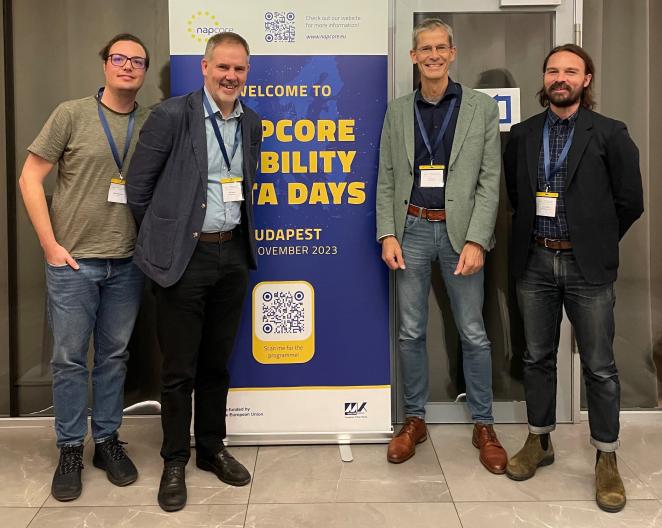Cycling Industries Europe (CIE) and imec, partners of MegaBITS, attended the NAPCORE Mobility Data Days in Budapest from the 7th to the 9th of November.

From left to right: Casper Van Gheluwe, Domain architect for Urban mobility & logistics from Imec, Kevin Mayne CEO of Cycling Industries Europe, Ronald Jorna MegaBITS Project Manager and Samuel Pierce MegaBITS Communications Manager
For CIE, this was an important opportunity to formalise collaborations with the European Parking Association and ITxPT via the signing of MoUs with both of these organisations. These agreements aim to extend data standards to cycle parking and address challenges in data exchanges within the cycling ecosystem. CIE believes these collaborations will enhance the provision of standardized data to various stakeholders, supporting more efficient and sustainable mobility.
The partnerships also align with MegaBITS' goals for intelligent transport systems in cycling. CIE's Project Manager, Sam Pierce, highlighted the potential for groundbreaking integration of bike sharing standards and addressing challenges in cycle parking. The agreements formalize ongoing collaborations, fostering practical projects and knowledge exchange.CIE has been leading the cycling ecosystem strategy on development of Intelligent Transport Systems (ITS) for cycling since it was founded in 2018. The work of CIE’s Expert Group for Connected Cycling and ITS also supports MegaBITS goals by uniting companies and innovators in the sector to exchange on technologies, data deployment and new business models.
NAPCORE Cycle Ambassadors and CIE, supported by the MegaBITS project, organised a session dedicated to cycling data standardisation, bringing together mobility data experts from all sectors of the industry. The session focussed on the challenges associated with collecting and measuring cycling data sets, particularly in the areas NAPCORE committed to standardising, which includes bike parking, bike counting, Floating Bike Data and cycling infrastructure. Standardisation of cycling data sets is a key outcome of the MegaBITS project, ensuring efficient processing, management and decision making for policy officials, and facilitating the growth of services in the cycling industry. MegaBITS partners are uniquely placed to play a key role here with the expertise that the cities and cycling ecosystem in the North Sea Region has on offer, and CIE is working to connect the two to ensure a joined-up approach to the digitisation of cycling.
This forms just the start of a much bigger effort to enlarge the stakeholder community on this topic and ensure the creation of standards that meet the needs of industry and policy makers. CIE therefore calls on companies and other stakeholders within the cycling community to participate in this standardisation process. Should you be involved in bike parking, counting, Floating Bike Data and cycling infrastructure, reach out to Sam Pierce (s.pierce@cyclingindustries.com) to get involved in this process.
For imec, the event was an opportunity to gain valuable insights into mobility data standardization and provisioning. The presentation of the mobilityDCAT-AP metadata standardrelevant for MegaBITS and the European Mobility Data Space - aims to enhance data interoperability and accessibility, streamlining sharing across various sources and National Access Points (NAPs). imec also explored the NAP reference architecture via a session structural framework of the National Access Points and on the decision and alignment processes behind the creation of this architecture.
Furthermore, the panel discussion on urban data provisioning, featuring insights from POLIS, several public transport operators and their European associations, and DG MOVE, provided valuable perspectives on urban mobility data management in general. One insight of particular relevance for the MegaBITS project is that being an early adopter may not always be an advantage should later adopters decide to go in a different direction. The MegaBITS project will keep this in mind in the further development of the bicycle data space!
